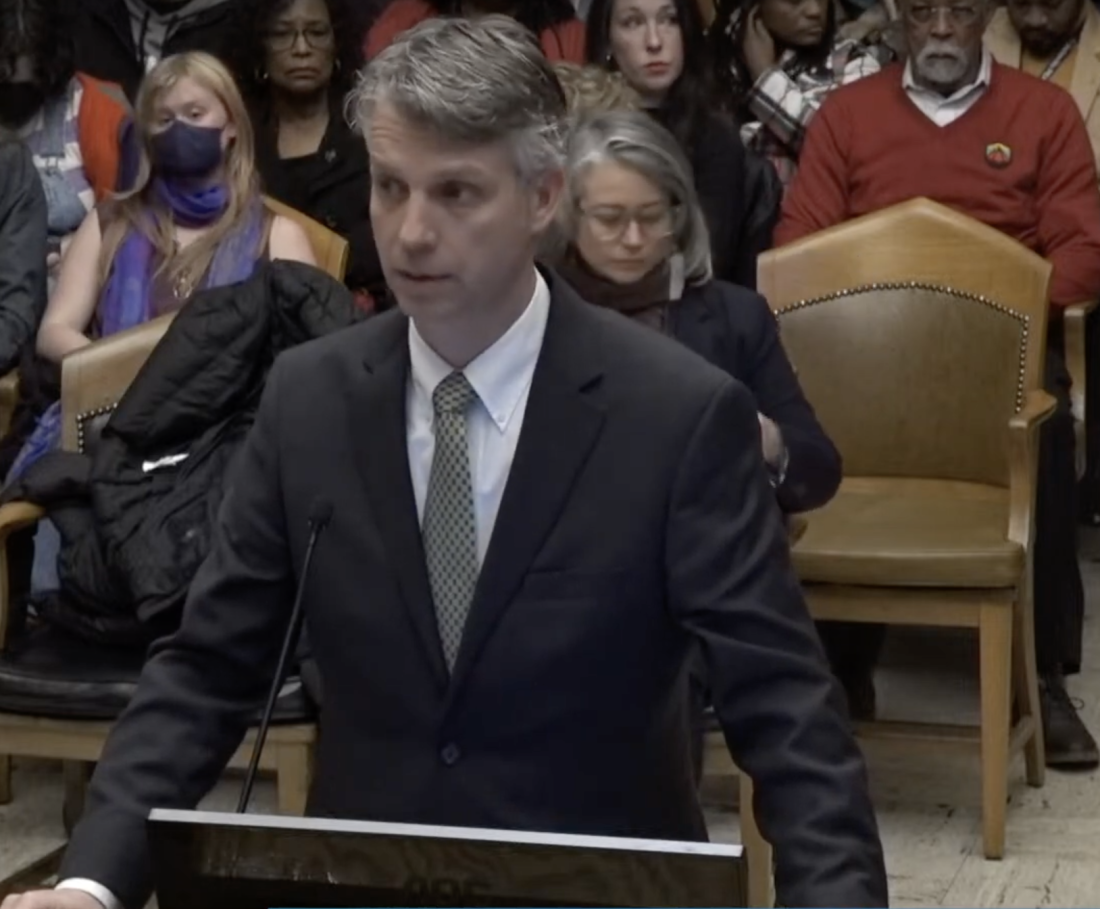Asheville City Council postponed a vote on the installation of a prefabricated 24-hour restroom outside the Rankin Avenue parking garage at its Jan. 23 meeting over concerns regarding the project’s cost and maintenance. Council previously voted to allocate $650,000 of American Rescue Plan Act funds for the new facility in May 2022.
The project aims to fill the gap left by the city’s last 24/7 restroom at 29 Haywood St., which closed in March 2020 and never reopened. City officials cited increased maintenance costs, drug use and vandalism as causes for its permanent closure.
“One of the biggest things we noticed with the bathroom at 29 Haywood when we tried keeping it open 24/7 was that as soon as it was unstaffed, vandalism and other issues would occur,” said Jade Dundas, capital projects director. “That often led to additional downtime the next day. Depending on the severity of the issue, that might have been several hours to half a day.”
As previously reported by Xpress, the proposed restroom is set to be a Portland Loo, a 7-by-10-foot single-stall structure that would provide enough room for a wheelchair, bike or stroller. Dundas said the facilities are built to be more resistant to vandalism and easier to clean. Additional site lighting and security cameras will also be installed to mitigate issues with vandalism. The bathroom’s blue interior lighting also makes it difficult for intravenous drug users to find a vein for injection.
Council member Kim Roney expressed her support for the project, noting that she has had to help sanitation workers to clean human excrement off the sidewalk on multiple occasions.
“It is very unpleasant, and I don’t even have a place to wash my hands afterwards because the bathrooms are closed,” Roney said. “Because this is such an important public health investment, I intend to support it.”
Additionally, Roney applauded the project’s accessibility.
“This is designed for maintenance and high-traffic use, unlike our port-a-potty in the same location,” said Roney. “I also think that [the ADA compliance] is so important. We are talking about making our sidewalks and our mobility infrastructure ADA compliant, but our port-a-potty isn’t.”
Other members of Council were more apprehensive. Mayor Esther Manheimer expressed concern regarding the project’s cost, particularly with other public bathrooms in the area on Haywood Street and Pack Square.
“People often ask me, ‘How come you have to spend $650,000 on a bathroom?’” she said. “It’s not just the bathroom that we are paying for; you also have to run all of the utility services to the site. It is a lot of money, so I just want to make sure that we fully look at our other current facilities that are within a block of this location and just make sure there isn’t a way to open those so that they are more available.”
Manheimer said the city is in early talks with the Asheville Downtown Association, whose offices neighbor the Haywood Street facilities, to help reopen and maintain those bathrooms. Manheimer also suggested partnering with shelter operators to provide bathrooms on nights and weekends.
“We are looking at other things that we still need to fund, so I would really like to see where the discussions [with the Asheville Downtown Association] land before we commit to this project,” said Manheimer.
Council member Sandra Kilgore echoed Manhiemer’s concerns, also mentioning potential issues with the facility’s maintenance.
“I am really concerned about this facility’s maintenance and cleanliness, and I am curious if it will really address the needs that we have downtown,” Kilgore said. “I think that by exploring the restrooms that we have now, including their service and hours, we could make them more accommodating. … But just to have a bathroom there that we still are not maintaining 24 hours, is that really doing what we want it to do?”
Dundas noted the possibility for the bathrooms at Pack Square and Haywood Street to be reopened with 24/7 availability but said that the city “would have to consider full-time attendance.”
With questions remaining around the project’s feasibility and the potential for more affordable options down the road, Council opted to postpone a vote on the issue until February to give city staff time to reassess the project and provide alternatives.
In other news
City Council also heard a presentation from Elyse Marder, spokeperson for the Realignment Working Group, which was created by the city and tasked with assessing the city’s engagement with advisory boards and commissions. Marder summarized the input that the group received from the Board and Commission Experience Survey, which was distributed to all current and past board members (up to 10 years) in November 2022.
According to the presentation, board members felt strongly supported by city staff but noted high staff turnover as a hindrance. Additionally, Marder noted that board members were most dissatisfied with interactions with City Council, citing issues with communication.
“The overarching theme from the comments is a feeling of powerlessness,” Marder said. “One member wrote, ‘Serving on the board was a complete waste of time. Great people. Completely powerless to make recommendations or changes.’”
The Realignment Working Group made no formal recommendations, but Marder noted that recommendations would be presented in the coming months.




